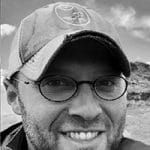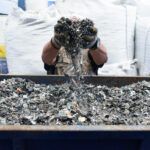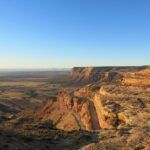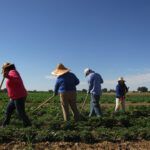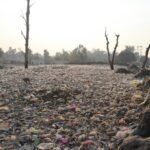To win over communities of color, environmental groups need to show they’re trustworthy
By Eric Siegel | October 31, 2020
 Noé Orgaz, an organizer from Conservation Colorado, at a Protgete community organizing training last year. Image courtesy of Conservation Colorado
Noé Orgaz, an organizer from Conservation Colorado, at a Protgete community organizing training last year. Image courtesy of Conservation Colorado
Editor’s note: This story was originally published by High Country News. It appears here as part of the Climate Desk collaboration.
In 2018, when Noé Orgaz, an organizer from Conservation Colorado, first attended the all-women’s group Mujer, Fuerza y Sentimiento (or “Women, Strength and Empowerment”) in Denver’s Montbello neighborhood, he was told to sit quietly at the back of the room. “You’re welcome to be here, but not to speak. You can observe,” a facilitator politely explained.
The group, which started in a McDonald’s lobby in 2015, helps Latina women empower each other and advocate for changes in their community. Orgaz, who came on behalf of Protégete (“Protect Yourself!”), the organization’s Latino organizing arm, wanted to ask the women to testify in support of House Bill 1261. Known as the Climate Action Plan, it set Colorado on course to reduce its greenhouse gas emissions by 90 percent in 2050 and improve air quality, a critical issue for the women’s group. But getting their support wouldn’t be so easy.
The group had good reason to be wary of outsiders. After a previous Conservation Colorado organizer abruptly stopped attending meetings, the women feared that their information was being used without their consent. Even though that wasn’t the case, they no longer trusted people like Orgaz. “You guys are a transactional organization,” he remembers the facilitator telling him. “You come in, take what you want, leave, then come back when you need something else.”
This distrust has made it difficult for conservation groups like Conservation Colorado to reach out to communities previously marginalized by the environmental movement. Environmental organizations are realizing that if they want to attract a broader constituency, they must first make up for past missteps.
That requires atoning for a past that was exclusionary from the outset. It is well documented, for example, that the conservation movement—historically the province of elites and white recreationists—has focused on protecting wilderness and public lands at the expense of environmental justice. Legacy conservation organizations, like the Sierra Club and The Wilderness Society, have recently acknowledged this, releasing statements that address their own histories of racism. “It’s time … (for) some truth-telling about the Sierra Club’s early history,” executive director Michael Brune said, acknowledging that the organization’s founders, notably John Muir, advocated “for both the conservation of nature and the conservation of the white race.”
This history is still a barrier to building trust today, Orgaz admits. He’s met older Latinos, he says, who recall how Colorado’s former Democratic governor, Richard Lamm, allied himself with environmental groups on an anti-immigrant platform. Limiting immigration, Lamm argued, would reverse the environmental degradation that results from unchecked population growth. In 2004, Lamm angled for a seat on the Sierra Club’s board of directors, knowing that the organization had previously promoted similar views. (He lost). “That’s an issue in the minds of folks,” Orgaz tells me. “It’s in the conversation. These are our realities.”
But there is also skepticism about the way conservation groups operate. Often, organizations have strict funding timelines and protocols dictated by funders with their own agendas. This can short-circuit the trust-building process, said Brent Davies of Ecotrust, an Oregon conservation group that works with Indigenous communities. Building a genuinely collaborative partnership takes time. “It’s very important to talk to a variety of people — and get formal permission,” she said. This echoes her words during a recent seminar about reframing conservation. Rather than mandating a solution, organizations should “look for outcomes that are community-led and collectively shared,” she said.
If Orgaz wanted to work with the Denver women’s group, he had to do more than just promote his organization’s agenda. He had to show he cared deeply about the issues directly impacting their communities—lack of green space, inadequate sidewalks, rampant air pollution. So Orgaz, who now works for the Sierra Club, attempted to reshape what conservation looked like. He sought to connect the dots between everyday health and environmental issues—such as asthma—and the overall effects of heat and air pollution, for example.
He eventually was able to build relationships with people like Dina Puente. In 2012, Puente, her husband and three daughters moved from a small farming community on Colorado’s Front Range to Montbello, where there were more opportunities for her children. But, shortly after moving, her daughter Daniela started having difficulty breathing. The neighborhood is disproportionately impacted by pollution due to a nearby petroleum refinery, interstate highway and former EPA superfund site. After Daniela underwent multiple medical procedures and missed 114 days of a school year, doctors eventually diagnosed her with severe asthma. “My second home is still the Children’s Hospital,” Puente said recently.
Puente and 11 other women from her group eventually participated in one of Protégete’s community organizing trainings, where they learned new tools for gathering and sharing their community’s stories with elected officials. As a result, they were able to prevent a nearby waste treatment plant from expanding into their community.
“People who have been disproportionately impacted by pollution are ‘expert witnesses,’ especially when it comes to the effects of climate change,” Orgaz said. “These are real people feeling the effects.”
Together, we make the world safer.
The Bulletin elevates expert voices above the noise. But as an independent nonprofit organization, our operations depend on the support of readers like you. Help us continue to deliver quality journalism that holds leaders accountable. Your support of our work at any level is important. In return, we promise our coverage will be understandable, influential, vigilant, solution-oriented, and fair-minded. Together we can make a difference.
Keywords: climate change, climate crisis, environment, environmental justice, global warming
Topics: Analysis, Climate Change
